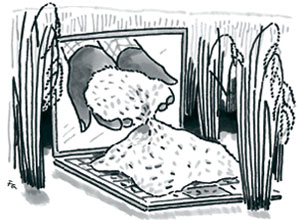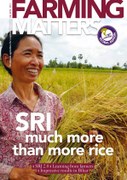The World Bank Institute (WBI) developed the multimedia toolkit “Achieving more with less: A new way of rice cultivation” to illustrate knowledge and techniques on SRI. The toolkit was developed from an experience with SRI in the Philippines in 2007, where farmers piloted the approach within their specific socio-environmental conditions, with very encouraging results in terms of yields and water savings.

to-farmer learning. If farmers’ willingness is complemented with local knowledge, the adoption can be scaled up.” The toolkit has also become a teaching material for professors at local universities in both East and West Africa, and has been translated by an agricultural research centre in Malawi. From 2009 to 2012, WBI has used the toolkit in South-South learning events which include SRI and conservation farming as climate change adaptation measures. Farmers, government staff and researchers in Kenya and Malawi have reviewed the toolkit and discussed it with colleagues in other countries (such as India, Madagascar and Rwanda) via videoconferencing. “As a result of the South-South exchange, Indian practitioners used the SRI toolkit as a basis for training government officials, university researchers, local artisans and farmers at farmer schools in Kenya,” Mei Xie recalls. At one of these occasions a Malawian farmer commented: “You have given us something better than money, because you can only use money once. This is so good, and it will be with us the rest of our lives and we will be able to make much more out of it.”
The World Bank Institute is the capacity development branch of the World Bank. It designs and delivers learning programmes for development stakeholders, and collaborates with policy makers, civil servants, technical experts, business and community leaders, parliamentarians, civil society stakeholders and other learning institutions. For more information on the SRI toolkit or the South-South learning events, contact Mei Xie (mxie@worldbank.org).

